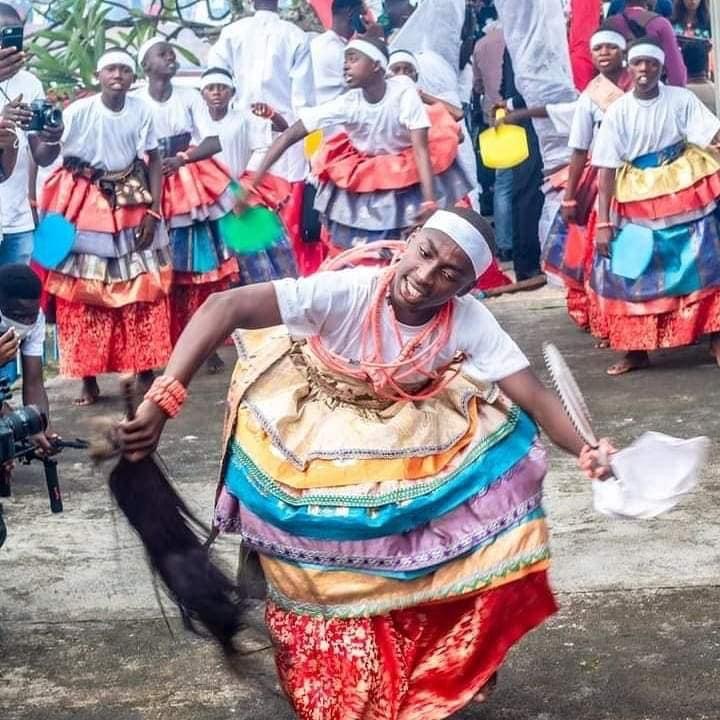The word “culture” as it relates to a people is, simply put, the totality of the people’s way of life. It is what draws a line between one person and another or a group of people and another.
Itsekiri as a people has one of the richest cultures among the black races of the world. The culture of Itsekiri is so refined and distinct, probably because it derived its root from many sources. In terms of language, it has affinity with Yoruba and Portuguese, and in royalty with Bini. In other areas like mode of dressing, worship system and the celebration of death, Itsekiri culture displays some European, Egyptian and Jewish traits.
This wide embrace of cultural backgrounds by Itsekiri is attributable to a number of factors including their early contact with the Europeans and early acquisition of western education. It is on record that before Eyeomasan (Dom Domingos) became Olu Atuwatse in 1625, he studied in Portugal and finally graduated from the University of Coimbra. Also, Olu Esigie (1580 – 1597) sent his son to Angola to acquire education, while three children of Olu Abejoye (1673 – 1675) attended school in Sao Tome. It is this age-long culture, which our forebears nurtured and handed down to us, that has carved a niche for us in world history despite our minority status.
Today, however, because of misconception about Christianity, we no longer see our culture as important. Rather, we now regard everything that has to do with culture as paganism. Truly speaking, Itsekiris have never at any time practiced paganism, which is non-belief in any of the known religions of the world. What our people practiced as traditional religion and handed down to us is Polytheism, which is the belief in the existence of intermediary gods who are messengers of the Supreme God (Udeji). This was the product of the combination of what they practiced before the seventeenth century with Christianity, which the Europeans brought to them both of which emphasize the fear of God and love of others. The following are some Jewish practices in the Holy Bible, which are synonymous with Itsekiri culture: (1). Visiting the grave of a dead person with the necessary offering the third day after burial. (2). Wearing of black apparel as a mark of bereavement. (3). Using animal blood as an identification mark on the walls of a house is a feature of ancestral worship which still persists in Itsekiri today. (4). The use of strong drink for offerings to the intermediary gods and departed souls. This is contained in the books of Numbers Chapter 28, Verse 7 and Deuteronomy Chapter 14, Verse 26.
It is important to say that of all the past Christian Olus of Warri, only Atuwatse II (1987 – 2015) can be said to have completely abandoned the traditional Shrines in Itsekiriland. Even at that and contrary to what people might consider as his total rejection of traditional ethics, he conferred Chieftaincy title on the Chief Priest of Oguejigbele, Arthur Diden and made him a member of his cabinet. What the past Christian Olus, including Erejuwa II did was to allow the setting up of a Church in the Palace and not necessarily destroying the traditional Shrines. This is what still persists in Benin Kingdom today, where there is a Church called the Holy Aruosa Cathedral, where the Oba worships, the same line the present Olu, Ogiame Ikenwoli has also toed. In fact, it is gratifying that Ogiame Ikenwoli, from what we have seen so far within the first twenty two months of his reign, has shown that he has come to relive all that was abandoned for twenty eight years.
While the disposition of the monarch is applauded, the point must be made loud and clear that the revival of the different traditional worship centers and landmarks at Ode-Itsekiri, the resuscitation of Awerewere and Okunkpikpa as well as Ogbowuru ancestral worship and the performance at Otuekine Shrine in Orugbo are just a little of what needs to be done to rejuvenate the Itsekiri rich cultural heritage. Going through the Holy Bible from Genesis to Revelation, there is hardly any of the sixty six books that does not have a name for God. Yet, our Itsekiri Christians who want to be holier than the Pope have decided to give the appellations such as Afomasin, Ogbowuru, Afoweretsewere and so on with which we adore our monarch from time immemorial to the same God who already has scores of names, in the flimsy excuse that such appellations connote too much powers and authority which can only be ascribed to God almighty. That is not all, the appellation “Ekunyeye ” by which the powerful Inama water spirit is called has also been given to God. Can anybody do this to the Oba of Benin who is adored with “Omo N’oba N’edo, Uku Akpolokpolo ”?
It will be recalled that September 4, 2013, the immediate past Olu, Atuwatse II, CON made a proclamation titled “The New Order of Iwere Nation” in which he proscribed many things including Ogiame as his title and the Itsekiri Anthem “Ara Olorire” which he said connote the worship of the goddess of Sea “Umalokun.” After four days of protests by Itsekiris, the Olu, exercising a high sense of wisdom as a good father recanted the statement. But today, four years after, a group of Itsekiri Christians is still adamant to the refusal to sing the Itsekiri Anthem. Rather, they now have another one which they call “Itsekiri Christian Anthem” which is rendered in the same syllables and tune as “Ara Olorire.”
Of greater concern is that a new traditional marriage system known as Itsekiri Christian traditional marriage system has been introduced. Under the new system, a priest, “Okpanran ” is dressed in full paraphernalia and he takes his seat after the usual paying of obeisance to the ancestors. But rather than using kolanut, palm wine, dry gin and cold water to offer prayers to join the couple, he uses only kolanut, table wine and cold water to pray for them in the name of Jesus. The ancestral plate “Uleje ” is conspicuously absent. In some cases, apple fruit cut into four parts is used in place of kolanut. The funniest aspect of it is that after the Okpanran has prayed for them in the name of Jesus Christ; the groom receives the drink and kolanut from him and pays obeisance to him with the names of the ancestors. What a confusion! To this group of Itsekiris, the teaching of Jesus Christ in the book of Luke, Chapter 20, Verse 25 that “give to Cesar what is Caesar’s and God what is God’s” does not make any sense.
The Nigerian Constitution recognizes only three systems of marriages namely: (1). Marriage under the marriage Ordinance that is usually conducted at Local Government Registry. (2). Marriage under Native Law and Custom which is mostly done in the Southern part of Nigeria. (3). Marriage under Sharia Law in the Northern part. The Constitution does not provide for anything like Christian system of marriage.
To further show the height of hypocrisy among our people, many of the born-again Itsekiri Christians who condemn the use of alcohol in any form have accepted Chieftaincy titles from the Olu and those of us who are familiar with the process of conferment know that everything from the inner chamber of the palace where it begins to the home of the recipient where people go to pay homage for three days, is done with dry gin.This confirms what Jesus Christ told the people and his disciples in the book of Mathew Chapter 23, Verses 2 and 3, “Do only what they ask you to do and not what they do because they will tell you one thing and do another.”
Today, our traditional festivals are gradually going into extinction because they have been classified as fetish. In some cases, they have been converted to Christian festivals, an example being Ajaoguoyibo, where their age-long masquerade festival has been replaced with “Uge Oritse.” Why can’t the two go pari-passu at different times as it is in Ajoki where the Okposo, Igisonmi and Ogheye festivals are still being held at the appropriate times, while the four Churches in that community also do their own things at different times?
At this juncture, the people of Okere in Warri deserve a path on the back for sustaining their over five hundred years old Anwankere festival which is now about to be listed among national festivals such as Argungun of Kebbi State, Osun Oshogbo of Osun State and Eyo of Lagos State. What baffles one most about the Okere festival is that a good number of the leaders of the community, past and present, are Christians of one denomination or the other. The present Onare-Aja Ogieboro (Chief) E.F. Esisi who is a Knight of the Catholic Church physically participates in the festival, although he appointed someone to perform some of the traditional rites, which his religion does not allow him to do. This is the way it should be.
In 2012, the immediate past Chairman of the neighboring Uvwie Local Government, Hon Peter Abugewa, who I understand is an elder in his Church, attended the Awankere festival. To my surprise, no Chairman of Warri South Local Government has ever attended the festival even though it is the biggest traditional festival in the Local Government Area. I think it is time we re-examined and retraced our steps about our attitude towards our culture so that we can have something to bequeath to our children. Yes, culture is dynamic but we must not allow religious fanaticism to overwhelm us to the extent of using our own hands to destroy the good things, which other people envy in us. Our culture is our identity. Therefore, all hands must be on deck to protect, promote and preserve it for posterity.
In the meantime, it is suggested that a body of Itsekiris who are knowledgeable and vast in Itsekiri culture and tradition be constituted to work out a blueprint for Itsekiri leadership to consider and enact as guidelines on Itsekiri Law and Custom. This is the only way to ensure that Itsekiri regains its lost glory in the comity of black races.




